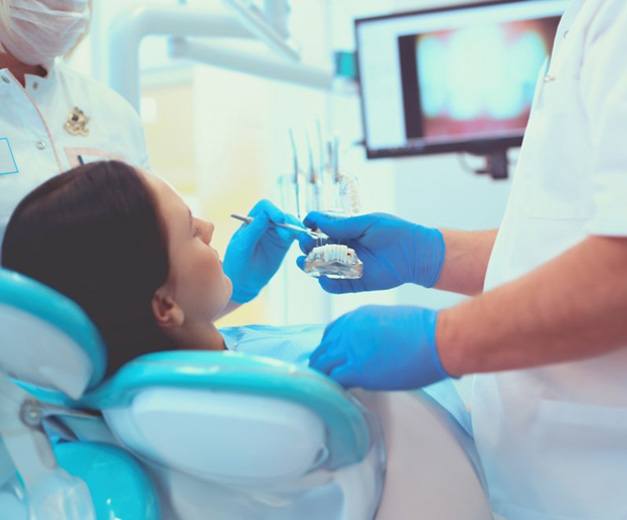Tooth Extractions – Burke, VA
Quick Relief
from Troublesome Teeth
A beautiful smile is a priceless asset, and our team at Northern Virginia Oral, Maxillofacial & Implant Surgery will do anything they can to save your natural teeth. However, there comes a point where a tooth is beyond saving and can cause infections to spread to other parts of your mouth. When this happens, it may be best to have a tooth extraction to eliminate the pain such a tooth causes while protecting the patient’s oral health. Our team will ensure that you are comfortable during the process and know about your replacement options. Contact our office if you believe you need a tooth extraction.
Why Choose Northern Virginia Oral, Maxillofacial & Implant Surgery for Tooth Extractions?
- Highly Trained and Experienced Oral Surgeons
- Clean, Comfortable, and Courteous Office Environment
- In-House Dental Implant Services
Reasons Why Tooth Extractions Are Necessary

While our team in Burke reserves tooth extractions as a last resort, they can be necessary under certain circumstances. Your dental healthcare provider may recommend extraction if:
- The tooth is afflicted with a severe infection that can potentially spread to other teeth. You may notice this because it can result in a severe toothache.
- The tooth is severely weakened to the point where it cannot be repaired or support a dental restoration.
- You need orthodontic treatment but your teeth are too crowded to be realigned.
- Your ailing teeth need to be removed to make room for dentures.
Rest assured, we’ll let you know the exact reasoning for your tooth extraction so that you can head into the process with confidence.
The Process of Removing a Tooth

The tooth extraction process begins with a thorough oral exam that often includes X-rays. Once we’ve considered the severity of the problem and all treatment options available, we may recommend extraction if the tooth cannot be saved.
If the tooth has already completely erupted, we can perform a simple extraction. For this procedure, we will numb your mouth before we incrementally loosen the tooth until we’re able to gently and safely extract it.
If the tooth has not erupted yet or has failed to erupt properly, as is often the case with wisdom teeth, a surgical extraction may be necessary. After numbing your mouth, our team will remove some gum and bone tissue to gain access to the troubled tooth before extracting it. Sometimes we’ll have to remove the tooth in several pieces to ensure the safety of the surrounding tissues.
Tooth Extraction Aftercare

Our team will provide you with detailed instructions for caring for your mouth after tooth extractions. To ensure your recovery is as speedy and smooth as possible, take care to:
- Refrain from smoking, spitting, drinking through a straw, or brushing the surgical area for the first twenty-four hours after extraction. These actions can distress the wound and dislodge the blood clot protecting it, causing a painful condition called dry socket.
- Keep your head elevated when sleeping for the first few days after the procedure.
- Avoid chewing over the surgical area. Stick to soft foods or liquids like yogurt, soup, smoothies, mashed potatoes, or scrambled eggs.
- To manage any post-surgical discomfort, take any medicines as prescribed or use over-the-counter pain relievers.
Understanding the Cost of Tooth Extractions

Dental treatments can be an investment, so it’s understandable that you’d want to have an idea of what a tooth extraction would cost. Many factors influence the total price of this service, making it difficult to pin down an exact number without a consultation. However, at Northern Virginia Oral, Maxillofacial & Implant Surgery, we do our best to help make dental treatments more affordable. To better understand the cost of a tooth extraction, you can read through the information below – and don’t hesitate to contact us with any questions!
Factors That Can Affect Tooth Extraction Cost

As noted, there are many different factors that could influence the overall price of your tooth extraction. To simplify it, we’ve put together a brief list of some examples:
- Quantity: The more teeth you need removed, the more you’ll likely pay for treatment.
- Location: Back molars are trickier to extract than a front tooth, which means more service time and a couple extra dollars.
- Extraction type: There’s more than one way to remove a tooth! A simple extraction is generally less expensive than an impacted extraction, because as the name implies, they’re less involved.
- Replacement selection: Last but not least, it’s important to replace your tooth with a dental restoration. Depending on which treatment you choose, you could end up paying more – or less.
Does Dental Insurance Cover Tooth Extractions?

Dental insurance can be confusing, which is why we’re always willing to help our patients navigate their plans. It’s important to understand that each individual policy is different, but in general, dental insurance companies will cover about 50% of tooth extraction costs. There are typically some limitations to this, such as needing to meet your annual deductible before your coverage will go into effect. That’s also something we can help you figure out, so don’t hesitate to give us a call to ensure you get the most out of your insurance!
Other Options for Making Tooth Extractions Affordable

We proudly accept several types of dental insurance plans, but also know that not everyone has access to these benefits. If you need alternative ways to afford your tooth extraction, we also offer:
- CareCredit financing, which allows patients to break down their overall cost into smaller monthly payments.
- A 0% monthly financing special for wisdom tooth extraction that starts at just $199 per month.
- A complimentary dental implant consultation for eligible patients.
To learn more about these options, give our office a call! We’d be happy to help find ways to make your treatment work with your budget.
Tooth Extractions FAQs
Does Getting a Tooth Extracted Hurt?
Many patients assume that removing a problematic tooth will inevitably be a long and agonizing process. Thankfully, that’s not the case! Before starting the process, our team will apply a local anesthetic to numb the area. Then, depending on the severity of your condition, we might also offer sedatives to ensure that you remain still, calm, and comfortable the entire time.
That means you won’t feel discomfort until the medications wear off after your appointment. Then, it’s normal to feel some tenderness and swelling for a week or two, but usually, it’s mild to moderate and dissipates over time.
If you experience sharp or persistent pain, call us to let us know so we can schedule another appointment or discuss care instructions over the phone.
What Can I Expect from Tooth Extraction Recovery?
After removing your troublesome tooth, your mouth must form a blood clot over the site to protect the exposed nerves and bone tissue. If this is damaged or dislodged, you could develop a painful condition known as dry socket. As a result, many of the post-op instructions we provide are intended to protect and preserve it. Following these orders can help you heal as quickly as possible without developing adverse side effects.
Some common directions include:
- Get plenty of rest. You need to take some downtime so your body can recover, which means avoiding strenuous physical activities that elevate your heart rate or blood pressure.
- Drink lots of water, but not from a straw because the force of suction can dislodge your blood clot.
- Clean your mouth carefully. For the first 48 hours, rinse with warm salt water to naturally disinfect your mouth without brushing away your blood clot. It’s usually safe to resume your usual at-home dental hygiene routine after 3 days.
- Don’t smoke. Cigarettes and vapes contain nicotine, which is a vasoconstrictor that limits your blood oxygen levels and flow. Your body can’t deliver essential nutrients to your mouth to fight infections, increasing the likelihood of gum disease or other issues.
Can I Leave the Space Empty Once My Tooth Is Removed?
Many patients wonder whether replacing their now-missing tooth is worth the investment, especially if the gap is further back in their mouth where it’s not easily seen. However, tooth loss impacts your dental health just as much as your appearance, so it’s better to replace it sooner rather than later.
For example, your remaining teeth might drift out of alignment to fill in the gap, which can wear down your enamel unevenly or prematurely, leaving you more vulnerable to decay and damage.
Furthermore, the roots of your teeth stimulate new bone growth in your jaw every time you bite down. Once one goes missing, the bone starts to thin and can eventually become too frail to support your teeth, resulting in additional losses.
How Should I Prepare for My Tooth Extraction?
Like any other surgery, it’s just as important to be properly prepared for your procedure as it is to take care of yourself afterward. Plus, if you’re feeling anxious, taking proactive steps to prepare can help soothe your frayed nerves.
One great way to get started is by discussing your questions and concerns with one of our experts before your scheduled procedure. An honest, open discussion about what to expect at each step in the process can help you feel confident about moving forward.
Then, depending on your situation, you might receive special instructions to follow before you arrive. For example, you might be asked to take a sedative ahead of time or avoid eating if you’re going to be under general anesthesia.
